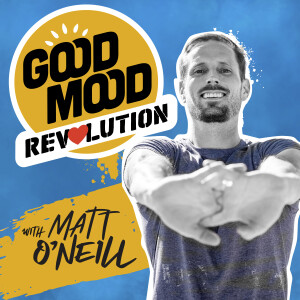
Why Change is So Hard (and How to Make it Easier) with Paul Levitin
 2024-07-08
2024-07-08
Ever wonder why making lasting changes is so difficult? You're not alone. Change can be challenging, but it doesn't have to be. Enter Paul Levitin, the expert behind "Change Made Easy," who has helped thousands transform their health, wealth, and relationships.
In this compelling episode, Paul unveils his groundbreaking EASIER framework, designed to make sustainable change truly achievable. Forget about the pressure of perfect goals; Paul explains why they often lead to failure and how embracing imperfect progress can set you on the path to success. Join Matt and Paul today to see how change can be easy and rewarding.
Here are some power takeaways from today’s conversation:
Making consistent habits and lifestyle changes for improved health and well-being
Why change is hard and how to make it easier
The EASIER framework for making long-term changes
Internal motivations for wealth, relationships, and personal growth
Enthusiasm and process for achieving goals
Embracing imperfection in relationships and daily routines
[03:42] Why Change Has to Be Hard
Paul thinks change inherently has to be hard because that's why you need to change in the first place. Things that are easy don't require making habits or goals around them. The things we want to change but have trouble doing, like exercising or healthy eating, are difficult because there is "friction between where we are and doing the thing." Specifically, doing the thing consistently is challenging because that's what produces results, not a one-time action.
[12:17] Why Willpower Only Works for Short-Term Goals
Willpower is only effective for short-term goals as it is a finite resource that will run out. Lifestyle changes require consistency over long periods like months or years. Relying solely on willpower is not sustainable for this duration. Making changes easier through enjoyable habits provides a better strategy for maintaining them long-term compared to using willpower alone.
[22:15] The EASIER Framework for Long-Term Success
E - Enthusiasm. Paul emphasizes that true motivation comes from enjoying the daily habits and actions required to achieve a goal, not just the end result. Being enthusiastic about the process is key for long-term consistency.
A - Available. Goals must fit practically within a person's current time constraints, energy levels, financial means and other resources.
S - Straightforward. Complex goals that are difficult to explain or understand take more mental energy and are less likely to stick. Plans work best when they are simple to implement without unnecessary complexity.
I - Imperfect. Embracing mistakes and setbacks as a natural part of progress helps keep people motivated. Seeing imperfections as opportunities for growth prevents people from being too hard on themselves when inevitable slip-ups occur.
E - Exponential. For habits to be maintained indefinitely, their benefits need to compound over time and provide returns well beyond just a one-to-one input-output relationship. Small actions should lead to exponential long-term rewards.
R - Repeatable. Forming strong habits through consistency is key to long-lasting change. Goals must be designed so the same behaviors can be repeated over weeks, months and years to become an ingrained part of daily life.
Resources Mentioned:
Change Made Easy podcast
Download this week’s free resource instantly when you sign up for The Good Mood Show newsletter here!
Or, reach out on our contact page at https://mattoneill.com/contact and we will email you a copy of any free resource you request.
About the Guest
Paul Levitin is the host of the popular podcast "Change Made Easy" and an expert on creating sustainable habits and lifestyle changes for improved health, wealth and relationships.
More Episodes
 2024-05-20
2024-05-20
 2024-04-25
2024-04-25
 2024-04-16
2024-04-16
 2024-04-04
2024-04-04
Create your
podcast in
minutes
- Full-featured podcast site
- Unlimited storage and bandwidth
- Comprehensive podcast stats
- Distribute to Apple Podcasts, Spotify, and more
- Make money with your podcast
It is Free
- Privacy Policy
- Cookie Policy
- Terms of Use
- Consent Preferences
- Copyright © 2015-2024 Podbean.com




